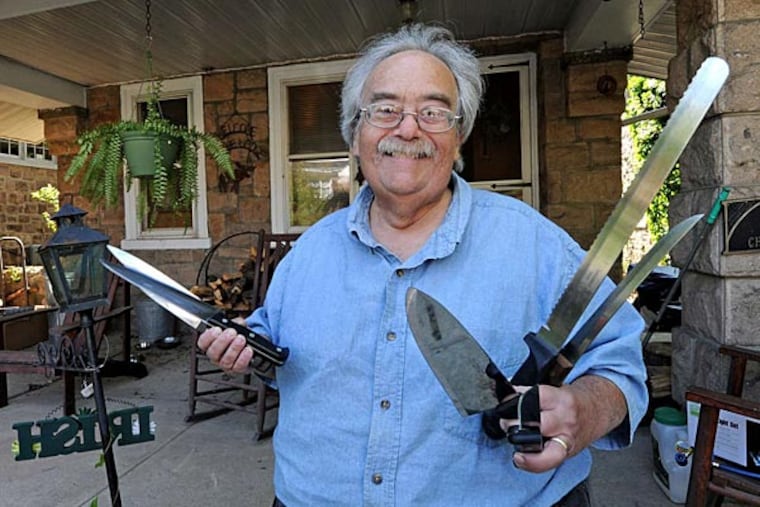Ambler man goes far in an old trade: Knife-sharpening
Neil Jacob lives on the edge. And, yes, he occasionally cuts himself. The people who seek him out for help, or who happen across his stand at weekend farmers markets, often assume that his breed and his craft died out about the time of the Great Depression.

Neil Jacob lives on the edge.
And, yes, he occasionally cuts himself.
The people who seek him out for help, or who happen across his stand at weekend farmers markets, often assume that his breed and his craft died out about the time of the Great Depression.
Jacob is living proof otherwise - a traveling knife sharpener, a man who turns dull into pointed and whose growing market extends across the Pennsylvania suburbs, south into Philadelphia, and as far north as Hoboken and Brooklyn.
"The best part is the people and their stories," said Jacob, 58, of Ambler. " 'When I was a kid, we had a guy who came around on a cart . . .' "
But he's not in it for nostalgia. Neil's Sharpening Service is a going business. People bring him knives so dull they wouldn't work as letter openers, so dull, he said, they couldn't open an e-mail. Jacob sharpens the knives and hands them back to their owners.
"I tell them, 'Don't run with it.' "
He's a connoisseur of steel, able to tell cheap from expensive at a glance, devoted to smoothing the dings and dents imposed by time and use. There's something about the act of sharpening a knife, he said, that's deeply satisfying: the spin of the grinding wheel, the rocky song of metal meeting grit. It requires concentration to a degree almost of transcendence. And, in a throwaway society, it offers the psychic reward of restoring a useless tool to a functioning instrument.
The only thing he can't sharpen is wits. Otherwise, bring it forward: scissors, garden shears, lawn-mower blades, hair clippers, axes, hatchets, animal clippers, carpenter planes, drill bits, circular-saw blades, chain saws.
"It's hard to find somebody to sharpen your knives," said Max Minkoff, president of the directing board at the Creekside Co-op in Elkins Park, which brings Jacob to the store the second Sunday of each month. "It's a great service to the shoppers and the members to have him there on a regular basis."
And, he said, it's good for the co-op. People tend to look around and buy while having their knives sharpened.
The co-op is part of Jacob's large and increasing rotation: the Lansdale Farmers Market on the fourth Saturday of every month, the Phoenixville Farmers Market the second Saturday, the Bryn Mawr Farmers Market the third Saturday, to Lower Makefield the second Thursday - and on and on.
Of course, the most lucrative segments of the knife-sharpening market have been largely claimed or disappeared. Stand-alone butcher shops have become rare. Top restaurants and chefs hire services that sharpen and return rotating sets of knives. Some stores, like Fante's Kitchen Shop in the Italian Market, offer knife-sharpening, and of course stores sell all manner of home sharpening gadgets.
But it turns out there are a whole lot of everyday people who need their knives and tools sharpened, so many that Jacob plans to add two helpers this summer. Jacob charges customers based on the length of the blade, generally $4 to $10.50. It costs $1 to get rid of nicks and $1.50 to fix a broken point, called "repointing."
He did not start out to be a knife sharpener. Who does? In the early 1970s at East Brunswick High School in New Jersey, he was devoted to the banjo and thought about becoming a musician or maybe a stand-up comic. Then he discovered how little beginners earned, if they could find work at all. He studied accounting at college, left before earning a degree, got a desk job at a food-processing company, cut meat as a butcher, worked as a locksmith, and then ran his own locksmithing business in New Jersey through the 1990s.
He always was good with his hands.
Even now, he does his own car repairs. He built the front wall outside his house on Church Street, converted the place to wood-burning heat, redid the plumbing, and put in new floors, walls, and ceilings. Any spare pieces of wood or metal get pressed into new uses.
"I'm like the pig farmer," Jacob said. "I use everything but the squeal."
He got interested in sharpening knives about three years ago, seeing a need, and since then has sharpened about 4,000.
Jacob recalls when he brought home his first grinding wheel and set it on a table. The kit contained six Band-Aids.
"That's not enough," his wife told him. It's Rosemary, a teacher, whose steady salary and health coverage provide their security, he said.
At markets and other settings, Jacob sets himself at one spot, his wheel spinning at a steady 200 r.p.m. People expect sparks when the knife touches the grinding wheel. There are no sparks.
"People ask me, 'Is this knife worth sharpening?' " Jacob said. "I tell them, 'If you use it, it's worth sharpening.' "
More information at http:// www.neilssharpeningservice.com.index.html.